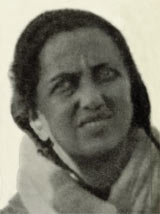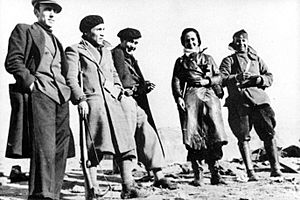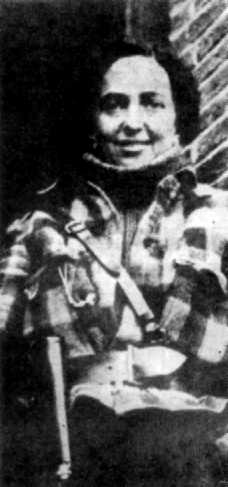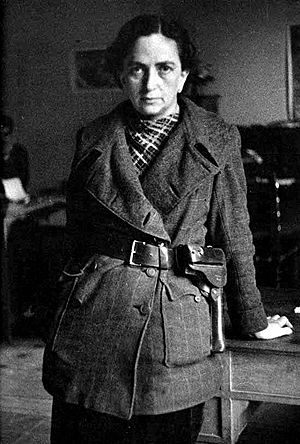Mika Feldman de Etchebéhère facts for kids
Mika Feldman de Etchebéhère was an Argentine activist who believed in freedom and fairness for everyone. She was born Micaela Feldman in Moisés Ville, Argentina, on March 14, 1902. Later, she became a captain in a special army group during the Spanish Civil War in 1936. She also worked with a group called Mujeres Libres which helped women. Mika passed away in Paris on July 7, 1992.
Contents
Mika's Early Life and Activism
Mika was born in 1902 in Moisés Ville. This was a small town in Argentina started by Jewish people from Russia and Eastern Europe. They had moved there to escape unfair treatment. Mika's father taught the Yiddish language there. Later, her family moved to Rosario, where he opened a restaurant. As a child, Mika heard many exciting stories about Russian fighters who escaped from prison.
When she was 15, Mika started working with an activist group in Rosario. With her friends, she created a group named after Louise Michel. Louise Michel was a famous French activist who fought for workers' rights.
In 1920, Mika studied to become a dentist at the University of Buenos Aires. There, she met Hipólito Etchebéhère, who would become her partner. He was part of a group that believed in workers controlling their own lives.
In 1924, Mika and Hipólito were inspired by the Russian revolution. They decided to join the Communist Party of Argentina. However, they were quickly asked to leave in 1925. This was because they had different ideas about how the party should work. They also refused to criticize Leon Trotsky, another important leader.
In 1926, Mika helped start a new group called the Workers' Communist Party. This group published a newspaper called La Chispa, which means "the Spark." People in this group were called "Chispistas." The group eventually stopped working together in 1929.
Mika then traveled to Patagonia in Argentina. She wanted to collect stories from people who saw a terrible event. This was a massacre by the Argentinian army in the early 1920s, known as "Patagonia Rebelde."
In 1930, Mika and Hipólito sailed to Europe. They visited the new Second Spanish Republic in Spain. Then they went to France. In October 1932, Mika was in Berlin, Germany. She saw Adolf Hitler gaining power, which she called "a tragedy."
In 1934, Mika and Hipólito were back in Paris. They helped create another newspaper called Que faire ? This paper also shared communist ideas and was against the ideas of Joseph Stalin.
Fighting in the Spanish Revolution
On July 12, 1936, Mika was back in Madrid, Spain. This was just before the Spanish coup of July 1936, which started the Spanish Civil War. She and Hipólito volunteered to fight for a group called the Workers' Party of Marxist Unification (POUM). Hipólito became the leader of his fighting group. Sadly, on August 16, 1936, he was shot and killed during the Battle of Sigüenza.
After Hipólito died, Mika took his revolver. She was chosen to lead her fighting group, even though some men were unsure at first. She fought bravely in the siege of Sigüenza. She managed to escape from a cathedral before it was taken over by the enemy. By the end of 1936, she joined another military group in Madrid. This group faced very tough battles.
Mika then became a captain in the 14th division of the Spanish Republican Army. This division was started on February 10, 1937. During this time, she helped create libraries and schools for the soldiers. These were right on the front lines.
During the May Days of 1937 in Barcelona, Mika was arrested. This happened while she was fighting at Guadalajara. She was arrested by agents who supported Stalin. She was put in jail in Madrid. But she was freed thanks to a leader named Cipriano Mera. After being freed, she joined the Mujeres Libres group. This group worked for women's rights and freedom. She continued fighting on the front line until June 1938. After that, women were no longer allowed to fight on the front.
Mika then taught reading and other subjects in Madrid. She worked in a hospital run by the Confederación Nacional del Trabajo. She also continued her work with the Mujeres Libres. On March 28, 1939, Madrid was defeated by Franco's troops. Mika was able to find safety in the French school in the city. She used her passport to leave Spain and go back to Paris.
However, when World War II began, Mika was worried about the danger to Jewish people. She left Europe and returned to her family in Argentina.
Life After World War II
As early as 1946, Mika returned to France. She became a translator for Air France, an airline company. She also helped start a socialist group called the Cercle Zimmerwald.
Many years later, in May 1968, there were big protests in Paris. Mika was 66 years old then. She gave white gloves to student protesters. This helped them dig up cobblestones from the streets to build barricades. The gloves kept their hands clean, so police couldn't easily arrest them for having dirty hands.
Mika also took part in many protests against unfair governments in South America.
In 1976, she wrote a book about her experiences. It was called Ma Guerre d'Espagne à Moi, which means "My own Spanish Civil War." The book described her daily life on the front lines. It also shared the thoughts of the soldiers fighting for the Republic.
Mika passed away on July 7, 1992, in Paris. As she wished, her ashes were spread in the Seine River.
Selected Works
- Ma guerre d'Espagne à moi, Paris, Les Lettres nouvelles, Éditions Denoël, 1975, .
- Ma guerre d'Espagne à moi : une femme à la tête d'une colonne au combat, Arles, Actes Sud, 1998, ISBN: 9782742720613, .
- Ma guerre d’Espagne à moi, Milena, 2014, ISBN: 978-2-9548175-0-7, BnF.
Sources
- «Mika, la mujer capitana en la Guerra Civil Española era de Moisés Ville». Diario La Opinión. (in Spanish)
- Hugo Fontana (8 de febrero de 2013). «Mika, la capitana». El País. (in Spanish)
- «La capitana Mika sale del olvido». El País. (in Spanish)
- «Elsa Osorio rescata del olvido a "la Capitana", una Argentina en la Guerra Civil española». Europa Press. (in Spanish)
- Mika Etchebéhère, "Ma guerre d'Espagne à moi: une femme à la tête d'une colonne au combat", Libertalia, 2021. (in French)
See also
 In Spanish: Micaela Feldman de Etchebéhère para niños
In Spanish: Micaela Feldman de Etchebéhère para niños
 | Precious Adams |
 | Lauren Anderson |
 | Janet Collins |





